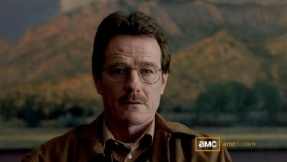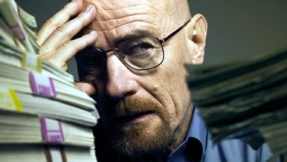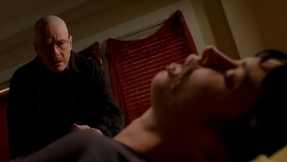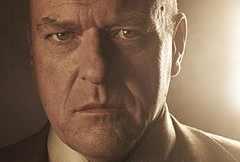The Moral Conundrum of ‘Breaking Bad’: Fate or Fortune?

Breaking Bad is the worst TV show ever made.
Not really, but hey, I got your attention.
Much has been written about the quality of this particular show, and there’s not really much more to say on that subject; it’s an astonishing dramatic work. It’s not perfect, because nothing is, but it is very, very good, and that’s that. I’m not here to break ranks with popularly accepted opinion, but to discuss an element of the show which has gnawed at me since I took my first tentative steps into Bad‘s long, dark tunnel of meth, money and morality.
Walter White’s story has always seemed to me to oscillate curiously between two divergent world-views. The first is a sort of not-quite-Nihilistic outlook, in which circumstance, the ticking of the universe, and the way the wind is blowing, ultimately reduce our carefully crafted institutions and values to rubble. There is no set pattern of life, which is why a fifty-year-old high-school Chemistry teacher can, with the right push, find himself at the head of a market-leading drug empire. Circumstance. Chance. The roll of the dice. These things shape every day of our lives, and it is these things that can turn a man from ‘good’ to ‘bad’.
The second, as distinct from the first as are the two perfectly cleaved sides of Walter White’s moral psyche, asserts the exact opposite of chance. It is fate. Forget the spin of some imaginary roulette wheel. No, no, no. Here, in Breaking Bad, we have a perfect representation of a Karmic universe ticking along without a missed beat. Walter White is a man who was always intended to become ‘evil’. He was always intended to be phenomenally successful, and rich, and evade capture time and time again. As Jesse says to Hank and Gomez, who are out to bring down White: ‘He’s smarter than you, and he’s luckier than you.’ But the universe knows exactly what it’s doing, and luck works both ways. Call it fate, or the will of the gods. White was always intended to be successful in his dubious enterprise. But so too were the weighing scales of the world so determined to rebalance themselves that his inevitable fall was just that: inevitable. We can trust the laws of the universe to uphold the moral high ground, and whilst it might take days, or months, or years, eventually fate has the last laugh, and what goes around will come around. It’s all planned.

Such is the moral dichotomy of Breaking Bad. Is it fate or fortune that sends Walter White off on his ultimately tragic course? I think in order to understand this, one must first understand the character of Walter White. I see him, at least initially, as a victim of circumstance. This is a man who is plodding along, unhappily but consistently. He’s emasculated by his lowly job as a Chemistry teacher. He once had a hand in something phenomenally successful, Grey Matter Technologies, but that was a long time ago. He’s gone, as so many in life do, from having the world at his feet to the world on his shoulders. There are millions of people in the world who feel as this man feels. But very few go on to become methamphetamine kingpins, murderers, thieves, or indeed a heady cocktail of all three.
So what finally seals the deal? Chance, circumstance, the luck of the draw. Walter’s cancer diagnosis is not an albatross around his neck, it’s the thing that destroys the albatross already hanging on to him for dear life. He realises that time is short. The clock is ticking, and every second counts. For the first time in a very, very long time, as he says in the pilot episode, this man is awake. The cancer in his lung is, ironically, the thing that allows him to finally breathe. There’s something just a little inspirational in that; for most people a diagnosis like Walter’s would signal the end. For him, it signals the beginning. But what brings this epiphany to fruition? Walt himself? No. It is that most fickle of mistresses: Lady Luck. Walter White just happens to get lung cancer despite having never smoked in his life. The odds were surely against him becoming ill, and yet he does, and it proves to be, in many ways, the making of him. Unfortunately, it’s also the breaking of him.
Would Walter ever have woken up one morning, kissed Skyler, eaten breakfast with his family and then gone out to cook meth had he never been diagnosed with cancer? I don’t think so. The cancer gives him both a practical reason, the economic demands of being sick, and a psychological one, that he has nothing to lose because he is already a dead man, to do what he does. It is the thing which wakes him from his years-long slumber, and it comes about from simple, unbiased, chance. The pendulum just happens to stop on Walter White, and it transforms him. As Bryan Cranston himself says: ‘Given the right set of circumstances, anyone…could become a completely different person.’ Perhaps the ultimate moral message of Breaking Bad is that anyone can be Walter White, if only they’re given the right push. Of course, it is Walter’s own choices that plunge him deeper and deeper into darkness, but the cataclysmic event that triggers the rest of the ripples in the pool, comes about through the unorganised chaos of everyday events. ‘Anyone, even the meekest person…is dangerous given the right set of circumstances.’ says Cranston. There is a Walter White, or perhaps a Heisenberg, in all of us. The fuel is always there, and we just need that one match to light the fire.

Of course, Walter transforms from good man to antagonist in spectacular fashion through his own making. But even in the course of the terrible acts he engages in, there is a constant tug-of-war between fate and fortune. Walt and Jesse flip a coin to determine which will dispose of Emilio’s dead body and which will have to kill Crazy-8, who is locked in Jesse’s basement. Walt draws the short straw. Perhaps he was always meant to kill. Or perhaps bad luck dictated that he would. But when push comes to shove, he can’t do the deed. He’s just too much of a good man. And then ‘the right set of circumstances’ transpires from no-where. The tied-up Crazy-8 steals a shard of a smashed plate, and intends to murder Walter with it as soon as he is set free. Walter has no choice, and he kills Crazy-8. The decision is made for him. Or is it? Is Walter White a cork tossed on the tide of happenstance, or was he always intended to kill? It could, of course, be argued that he got himself into the entire situation by choosing to cook crystal meth in the first place, but I don’t think Walter White, the original, plodding Walter White would ever have considered it had it not been for an event out of his control: the cancer. One event leads to another. The story is a ruthlessly effective distillation of the butterfly effect.
Nowhere is that more evident than the finale of Season Two, with that famous plane crash. Walter happens to be present when Jane, the woman Jesse is so taken with, and the woman who is blackmailing White, is choking to death after a heroin overdose. He is unlucky to be there at that specific moment, but he makes a conscious choice to stand aside and let the thorn in his side die a pathetic death. As a result of this, Jane’s air-traffic controller father blacks out whilst at work because of his overwhelming grief, and a plane crash ensues over Albuquerque, killing hundreds of people. All as an indirect result of Walter’s actions, or inactions to be precise. He lets Jane die, therefore her father is heartbroken, therefore he has his breakdown at work, therefore the disaster occurs.

With this chain of events, the show is perhaps illustrating a fundamental shift in the existence of Walter White. Walt letting Jane die seemed to me the furthest he could fall, and the point at which I finally gave up any pretence of seeing this man as a completely decent, but misguided, soul. No, from this point on, he’s damaged goods. More importantly, however, up until this point, from his cancer diagnosis onwards, he was a man at the mercy of events. From this fatal decision to let this woman die, however, he sets in motion a tragic sequence: he becomes the enabler of events, not the result of them. He is no longer a helpless entity caught in the ripples caused by the pebble thrown into the water, but the pebble itself, causing the ever-escalating events that befall the city. I’m almost tempted to reimagine that famous conversation with Skyler in Season Four: ‘I am the pebble! I am the one who ripples!’ I can see why they stuck with what they had.
Cranston and Vince Gilligan seem to deal with these issues slightly differently. Breaking Bad, for Bryan Cranston, is a story of the darkness in all of us, which can effortlessly manifest itself given the most fertile conditions. As he says: ‘there’s all these different seeds in a human being, but if they’re not watered and given some form of sunshine, they’re not gonna grow.’ We see these ‘seeds’ everyday on our television screens, just switch on the news. Hell, just walk down the street. Not a single one of us is completely pure, every person is sketched in shades of grey. We’re all capable of yelling at someone we love if our mood is bad enough, or walking out of a shop having been handed too much change from the cashier, rather than giving it back. The ‘seeds’ are there in all of us, but very few of us find ourselves in the right circumstances to make them grow. Cranston’s argument is that Walter is simply unlucky enough to be caught in one of those very situations, and as such the seeds do their work. Eventually he takes over, but it is not him that first waters the seed, it is happenstance. It takes chance to let Heisenberg out, and once that has happened, Walter does the rest.
Vince Gilligan’s viewpoint seems to divert a little from this. He hungers to see the bad guy get his comeuppance. He once said ‘I hate the idea of Idi Amin living the last 25 years of his life in Saudi Arabia. I feel some sort of need for Biblical atonement, or justice, or something. I like to believe…that karma kicks in at some point, even if it takes years or decades to happen.’ Such a viewpoint runs parallel with the idea that Walter’s actions are simply meant to be. Walter is a character both charmed and cursed. Both attributes point towards a kind of pre-ordained sequence of events, upon which Walter is stuck and cannot escape, and from this we eventually get Gilligan’s ‘justice’, or ‘karma’. One small action can have huge, huge repercussions in the Breaking Bad universe.

When the Salamanca Cousins buy weapons from a seller, he gives one of them a free ‘Black Death’ bullet. When they later target Hank, the last cousin standing drops this bullet, and Hank uses it to kill his attacker. Hank, effectively, survives through a chance action by the gun seller. But consider this: if the cousins had killed Hank there and then, he would never have discovered Walter’s secret. Perhaps it all would have been different, and Walter would have died an old man with his reputation intact. But from small acorns, mighty oaks must grow. Think of the killing of Gale Boetticher, directly orchestrated by Walt, which is perhaps the show’s most chilling murder. It is no coincidence, then, that it is this one which ultimately reveals Walter’s true nature to Hank, and sets in motion a devastating series of events which leaves both men dead. Is this Gilligan’s ‘karma’, the treachery inflicted on Gale returning to take its revenge? Or simply the chaotic ticking away of random, unprejudiced events, as Walt’s carelessness in leaving out The Leaves of Grass converges with Hank’s, ahem, pitt-stop in the bathroom?
I don’t think it needs to be said again just how complex, and subjective, and thrilling Breaking Bad is. Having written this article, perhaps I am completely wrong in my theories about the show. In fact, I know I am, because no theory is right. There can never be a right answer. Just a fascinating debate. And what of Walt? I must confess that Walter White seems, to me, a man who was never destined to commit terrible acts. The way the cards were dealt, however, dictated that the most unlikely person set off on a most unlikely transformation. As Bryan Cranston says, those ‘seeds’, are there in everyone, but it is the luck of life that determines if they ever bear fruit or not. Breaking Bad is a cautionary tale of what can happen when a person reaches the end of their rope, and decides to take it out on everybody else. It is both chance and the conscious actions of Walter White that lead him to where he ultimately ends up. Walt is caught out when he is, in the manner than he is, because he rises to the top of his profession and then gets sloppy and complacent, and therefore makes a catastrophic error. It isn’t Karma that does for Walter White, simply good old fashioned human error. Had he simply hidden that damn book, I think he could have carried on unchecked for another thirty years. I’d love to believe in Karma, but I guess I’m just too much of a good old-fashioned cynic, and the world doesn’t exactly seem intent on proving me wrong. Gilligan says that he ‘hate(s) the idea of Idi Amin living in Saudi Arabia for the last twenty-five years of his life’, but always remember that that’s exactly what Amin did.
What do you think? Leave a comment.










I never got the sense that the show was solely about Walter breaking bad, but rather all of the main characters being tested.
I did not root for him. Oh, I did feel sorry for him at the beginning. But at some point he became such an incredibly cruel person that I found nothing good in him. I have been horrified to hear that other audience members were rooting for him and considered him some sort of hero. This speaks volumes about the mentality of people today. I’ve never seen a more evil character portrayed on a screen.
I did love Jesse. While he also did terrible things, he had and never lost what Walt lost (or never had) – a conscience.
Well done article, although there are some parts I don’t totally agree with. But hey, that’s why it’s your opinion. Good job.
I see Walter White as a staunch conservative. Situational morality, willing to use stated family values to get what he wants while pursuing a questionable agenda, and ultimately wanting to try and control the destiny of everyone around him, all in the service of amassing a surfeit of money. In his strange way, Walt believes deeply in the American Dream as he tries to take criminal shortcuts to power and riches.
I haven’t watched a single episode of this show. TV is a wasteland.
?
TV is not a wasteland, this is an old trope of pseudo-intellectuals attempting to appear superior. Certainly, most television programming, like most books, movies, music, etc. is crap. There are, however, very talented persons working in television, and numerous excellent programs out there.
Get off of your high horse, and you will find some highbrow entertainment on the teevee.
TV was a wasteland. Today it can be poetry. Breaking Bad is amazing, easily the best thing I’ve seen on TV. At one time, people said the same thing about theatre and then along came Shakespeare. If you paint with that big of a brush, you’ll miss a lot of good stuff.
For all the imagery, I still think of Breaking Bad, as Walter Mitty meets Jekyll and Hyde.
I loved this show so, so much for the depth and analysis of each character, especially Walt. You can certainly see when he shifts from “good” to “bad” and what elements probed his descent. Great article!
Man, that first line definitely had me hooked. ha! I loved this show and I agree with a few parts of your theory. By the end Walt was callous and cruel. The things he put Jesse and his entire family through were horrific. When he finally admitted that the things he did was not to support his family but solely because it made him feel alive was perfect. I am one of the believers that the ending to Breaking Bad is one of the best finales in television history.
Breaking Bad is more of a psychological story than a morality tale for me. The story is about a wimp, a loser, a dishrag at home who develops a lust for power. At the very beginning, this guy, Walter White, has an out-of-character confrontation with someone in a parking lot and he gets a kick out the power of going all out, without regard to consequences, or morals. Of course he finds this power in the death sentence from cancer, and of course from time to time he seems to hesitate before crossing yet another of society’s boundaries.
Agree with every word. However we feel about his actions, the spine of the series is a man getting up off his knees and, in his view, taking back control, albeit with terrible consequences for all involved.
Anyway, thanks for reading!
I also feel like it was always about Walt taking back control of his life. After giving up his shares in Grey matter and becoming a high school teacher, I think he felt that he lost all control of his life and was meant to do something greater. I am not sold on the idea that everything was fated for him since I do not really believe in fate, but a lot of his success and failure was based on chance. Still, he was a smart guy making choices in order to take control of his life, especially after he was given only a year to die from cancer.
“The coin toss is sacred.” That’s a statement on fate. But they flipped it because they put themselves in that position. That’s free will.
This was a great article and really interesting to read! I think the notion of fate is a compelling angle that has not been fully explored or explained. I really enjoyed your take on a show that was immensely entertaining.
I always loved the contrast between Walter and Heisenberg. Even from the early episodes, when Walter explains to his chemistry class the difference between the morning sickness drug and its birth defect causing counterpart just how relatable it was to Walter’s persona. There’s a lot of symbolism here, and the ideas of justice and karma fit into Walt’s story perfectly.
I always thought it was unique how when the show started Walt was the likable character while Jesse Pinkman was the character people didn’t care for, but as time went on they effectively shifted roles and the Jesse became the most beloved character on the show while Walt became one of the most hated. It was a transformation that didn’t happen overnight, the shift was barely noticable as each episode passed, but eventually we saw a teacher become a drug kingpin and the meth head become the fan favorite.
It seems you missed an important element of Jane’s death. Walt doesn’t just happen to be there when Jane starts choking. He knocks her onto her back when he ties to wake Jesse, and this is what causes her to start choking. Indeed, Walt is directly responsible for Jane’s death. Does this change your thesis at all?
I don’t agree; it’s possible she could have moved onto her back without Walt being there. Also, even if he did accidentally knock her onto her back, it was just that: accidental. He didn’t intend to do it, and when he then lets her die, I still think it ties into what I’ve said in the article, which is that Walt is a man who finds himself at the mercy of circumstance, and makes his decisions in response to this. He may have caused it, but he didn’t orchestrate it, and that’s the difference I think.
Fate presented Walt with a choice.
I love the ideas you presented here, brilliant read!
Great article. Well thought out, some parts are not how I would have put it but overall this was good work.
The moral chaos of WW is working on so many levels. The evil of scientific rationality without pause. The perverted realization of frustrated goals and dreams, becoming the entrepreneur that he sold out for safety in his youth. The perverse will to power, that despite his ineptness, he is able to wind up winning against Crazy-8, Tuco, Gus and is the infiltrator of the DEA through his brother-in-law. Jesse has more of a conscience than Walt.
Yes, Jesse is Walt’s conscience.
I agree that, in the end, it was human error, not karma, that brought down Walter White. I can’t help but feel that even after his life spirals into a series of tragic events-the dissolution of his family and their trust, Hanks’s death-he still feels somewhat fulfilled by his Heisenberg persona. Yes, he is eventually killed by the enterprise, but in the meantime, he also taps into his brilliance and finally comes alive. I wonder whether WW, given the chance, would take it all back. I’m not sure he would, but I’m also not sure we can fully answer that question.
Very thought provoking article. I really get a sense of what you are trying to get across when comparing the events to a “butterfly” type effect. I also see this as karma, but almost in reverse. If we consider that the cancer diagnosis was the bad karma for all his bad deeds, it seems to fall in line. In this story, the bad karma hits him first, and now almost seems as though he is committing the bad acts to justify it. For certain there are times he is a victim of circumstance, whether it be bad luck or good luck, but he definitely makes some pretty horrifying decisions. I also think that had he not gotten the cancer, he likely would have lived out his life as the mild mannered chemistry teacher. But once the ball started rolling, he had to go with it, even though the majority of the time it was way out of control.
I really love this article because it tackles the complexities of the characters in Breaking Bad. It is not an easy task to transform characters and the audience’s perception of them, but this show mastered that. I never saw the final season but I was already convinced of the demoralization of Walter White during the seasons before that. Good job writing about a very complex topic!
I don’t think Walt ever sought out to become ‘evil’. In Walt’s words, everything is chemistry…the bonds of life. Walt’s associates along with his goals shifted as time progress (a slow chemical reaction) and he adapted to these new found bonds (whether it be from Tuco to Gus, or marriage to divorce). He immersed himself into unfamiliar realms and to stay afloat he couldn’t remain the same high school chemistry teacher. So I suppose like most things in life, it isn’t one side of the other (or as Pink Floyd would say ‘up and down but in the end it’s round and round’). A mix of fate and fortune shaped the character Walt had become in season 5.
This is such a well-written article, and you really touch on the intricacies of this show that make it such a thrill ride to watch multiple times. In the fate vs. fortune debate, it’s also interesting to think about all of the symbolism and archetypal images (even the names of the episodes) that contribute to the show’s moral and psychological tensions. But I would agree with what is being said here: the show for me was never fully about Walt’s transformation, but more about how his choices affect the people he loves, the people who loathes, and complete strangers. You could even say that the core of “Breaking Bad” is at least partially made up of those tenants of Eastern philosophy (like karma, as you talk about) that bring to light the fact that every being in the universe occupies a great network; we are all connected fundamentally. While Walt believes, much like Western philosophy instructs, that the internal ego is separated from the external world and that his actions will not have repercussions on those around him, his attempt to become God is his downfall. What could have saved him, possibly, is a realization that he is not at the center of the web; that his ego is not supreme; and that his actions will not occur without destruction–and ultimately self-destruction.
I don’t think it was destiny, it’s human nature to have good and bad traits. Given Walt’s options and circumstances at the time, he chose to go towards the dark.
“The cancer gives him both a practical reason, the economic demands of being sick, and a psychological one, that he has nothing to lose because he is already a dead man, to do what he does.”
Very good analysis here, and probably the reason the Walter never treats his cancer despite having ample opportunity to do so.